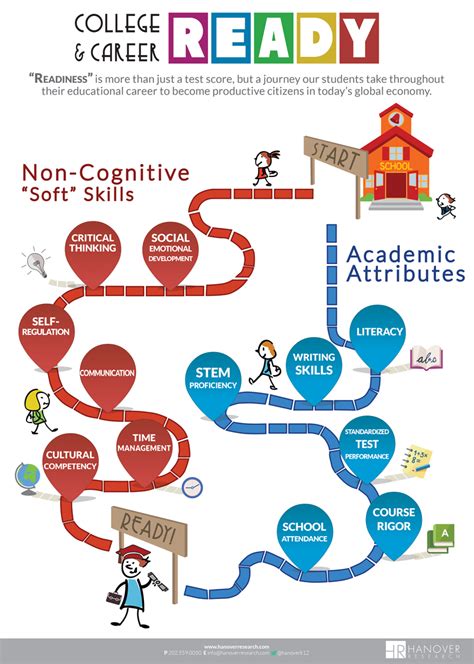College readiness encompasses the academic, cognitive, and personal attributes that prepare students for the rigors of postsecondary education. It involves mastering a comprehensive range of skills and knowledge that enable students to thrive in college environments and beyond.

Academic Readiness: Foundation for Success
- Strong Foundational Skills: Students must possess a solid foundation in core academic areas, including reading, writing, math, and science. Fluency in these subjects forms the bedrock for comprehending complex concepts and solving problems encountered in college coursework.
- Critical Thinking and Analytical Skills: The ability to critically evaluate information, analyze arguments, and draw logical conclusions is crucial for navigating college-level assignments and exams. Students need to develop these skills to succeed in research, writing, and problem-solving.
- Research and Information Literacy: College students are expected to be able to conduct independent research, evaluate sources critically, and synthesize information from various sources to form informed opinions and arguments.
- Academic Self-Discipline and Time Management: Time management, self-discipline, and effective study habits are essential for success in college. Students need to learn to prioritize tasks, manage their time wisely, and allocate sufficient time for studying and completing assignments.
Cognitive Readiness: Adapting to College’s Cognitive Demands
- Intellectual Curiosity: College readiness requires students to have an inquisitive mind and a thirst for knowledge beyond what is taught in high school. This curiosity drives them to engage in intellectual exploration and seek out new learning opportunities.
- Cognitive Flexibility: The ability to adapt to different learning styles, problem-solving approaches, and perspectives is crucial for success in college. Students must be able to shift their thinking and adjust to novel situations and challenges.
- Growth Mindset: Embracing a growth mindset—believing that abilities can be developed through hard work and perseverance—empowers students to overcome academic challenges and persist in their studies. They recognize that academic success is not solely based on innate talent but on effort and dedication.
Personal Readiness: Navigating the College Environment
- Self-Awareness and Self-Advocacy: Understanding one’s strengths, weaknesses, and learning styles helps students make informed decisions about course selection, study strategies, and support services. They should be able to advocate for their needs and seek assistance when necessary.
- Communication Skills: Effective communication, both verbal and written, is essential for success in college. Students need to be able to express their ideas clearly, participate in class discussions, and write well-reasoned essays and reports.
- Emotional Maturity and Resilience: College can be a challenging environment that requires emotional maturity and resilience. Students must be able to manage stress, cope with setbacks, and maintain a positive attitude even in the face of adversity.
- Interpersonal Skills: Collaborating with peers, working in groups, and building relationships with faculty are vital for college success. Students should develop strong interpersonal skills to navigate social interactions and engage in meaningful discussions.
- Financial Literacy: College expenses can be significant. Students need to develop financial literacy skills, including budgeting, managing debt, and planning for future financial needs.
Measuring College Readiness
Numerous organizations and institutions assess college readiness using standardized tests and other metrics. According to the National Center for Education Statistics (NCES), in 2022:
- 58% of high school graduates were deemed college ready in English Language Arts (ELA).
- 48% were considered college ready in Mathematics.
- Only 35% demonstrated college readiness in both ELA and Mathematics.
Strategies for Enhancing College Readiness
- Early Intervention and Support: Provide students with early identification and support to address academic and non-academic barriers that may hinder college readiness.
- Rigorous High School Curriculum: Ensure that high school curricula align with college expectations and challenge students academically.
- Dual Enrollment Programs: Offer dual enrollment programs that allow high school students to take college courses while still in high school.
- Targeted Interventions: Provide targeted interventions to students who are struggling in academic areas that are critical for college success.
- Mentoring and Advising: Connect students with mentors and advisors who can provide guidance and support throughout the college readiness journey.
Tips and Tricks for College Readiness
- Take Challenging High School Courses: Push your boundaries and enroll in challenging courses that will prepare you for the rigors of college.
- Develop Strong Study Skills: Establish effective study habits, such as active reading, note-taking, and regular review.
- Engage in Extracurricular Activities: Participate in activities that develop your interests, skills, and personal growth.
- Seek Out Mentorship: Find mentors who can provide guidance, support, and advice on your college readiness journey.
- Practice Time Management: Learn to manage your time wisely, prioritizing tasks and allocating sufficient time for studying and completing assignments.
Common Mistakes to Avoid
- Underestimating the Importance of College Readiness: Failing to recognize the importance of college readiness can lead to academic struggles and frustration in college.
- Ignoring Academic Deficiencies: Neglecting to address academic deficiencies in high school can create a significant challenge for college success.
- Procrastinating and Avoiding Challenges: Putting off challenging tasks or avoiding academic support can hinder progress and limit college readiness.
- Lacking Self-Discipline and Time Management: Poor self-discipline and ineffective time management can sabotage efforts to achieve college readiness.
- Ignoring Personal and Emotional Well-being: Neglecting personal health and emotional well-being can impact academic performance and overall college readiness.
Conclusion
College readiness is a multi-faceted concept that encompasses a wide range of skills and attributes. It is essential for students to develop a solid foundation in academics, cognition, and personal development to thrive in the challenging environment of higher education. By understanding the components of college readiness and embracing strategies to enhance them, students can increase their chances of success in college and beyond.
